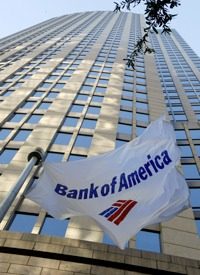
Taibbi wrote his letter to Occupy Wall Street (OWS) supporters on March 27, giving a short talk to them about the worst of the banks — the Bank of America — and then handing out copies of it to the demonstrators. In typically lurid prose, Taibbi said that Bank of America has systematically defrauded almost everyone with whom it has a significant business relationship, cheating investors, insurers, homeowners, shareholders, depositors, and the state. It is a giant, raging hurricane of theft and fraud, spinning its way through America and leaving a massive trail of wiped-out retirees and foreclosed-upon families in its wake….
But Bank of America hasn't gone out of business, for the simple reason that our government has decided to make it the poster child for the "Too Big To Fail" concept. Because it is considered a "systemically important institution" whose collapse would have a major, Lehman-Brothers-style impact on the economy, two consecutive presidential administrations have taken extraordinary measures to keep Bank of America in business, despite a staggering recent legacy of corruption schemes.
In addition, Taibbi wrote,
This bank is like the world’s worst teenager, taking your car and running over kittens and fire hydrants on the way to Vegas for the weekend, maxing out your credit cards in the three days you spend at your aunt’s funeral.
He concluded that the only way to solve the Bank of America “TBTF” problem is to let it be subject to free-market forces: “It would be a great sign of America’s return to healthier capitalism is we could allow one of the worst of public-private monsters, Bank of America, to sink or swim on its own, in the free market.”
Scarcely two days later Richard Fisher, president of the Federal Reserve of Dallas, introduced a massive study of “TBTF,” completed by Harvey Rosenblum, head of the bank’s research department. Fisher wrote:
If you are running one of the “too big to fail” banks [i.e., Bank of America, and others], I doubt you are going to like what you read in this annual report….
[These banks] were a primary culprit in magnifying the financial crisis, and their presence continues to play an important role in prolonging our economic malaise….
In my view, downsizing [these] behemoths over time into institutions that can be prudently managed … is the appropriate policy response. Only then can the process of “creative destruction” [of the free market] … work its wonders in the financial sector just as it does elsewhere in our economy.
The TBTF concept allows the federal government, in coordination with the New York Federal Reserve, to decide which banks to rescue with taxpayer bailouts, based upon their “systemic” importance. Like mountain climbers secured by a lifeline, if one climber falls, the others go with him unless the lifeline holds. But this analogy relies on a third party determining which climber to save — such as Bank of America — and which to let fall to his death — like Lehman Brothers. And that decision has become so politicized through graft, insider dealing, and cronyism that it is made not in the interest of serving the public and letting the free market sort out winners and losers, but by "who knows whom." As Sheldon Richman, editor of The Freeman magazine, pointed out:
Like his predecessors, Obama has been a good friend to big companies, especially banks. Take Bank of America. BofA is what you’d expect of a financial institution coddled by government subsidies and privilege: inefficient, corrupt … and a frequent corporate-welfare recipient.
Solutions to problems like TBTF and its worst example, Bank of America, however, are largely missing. Taibbi wants the free market to operate and clean out the mess at BofA:
In a pure capitalist system, an institution as moronic and corrupt as Bank of America would be swiftly punished by the market — the executives would loot their own firms once [and] then they’d be looking for jobs [elsewhere].
But Taibbi’s plan for how to get there from here is missing. Author Rosenblum is also out of answers:
Concentration in the financial sector is anything but natural. Banks have grown larger in recent years because of artificial advantages, particularly the widespread belief that government will rescue the creditors of the biggest financial institutions. Human weakness will cause occasional market disruptions. Big banks backed by government turn these manageable episodes into catastrophes.
What about Dodd-Frank, the bill explicitly sold as the remedy for TBTF? Says Rosenblum,
The new law leaves the big banks largely intact. TBTF institutions remain a potential danger to the financial system. We can’t be sure that some future government won’t choose the expediency of bailouts over the risk of severe recession or worse. The only viable solution to TBTF lies in reducing concentration in the banking system, thus increasing competition and transparency.
Despite the noise from Taibbi and the sonorous lamentations from Rosenblum, the movement actually to change and improve the system and remove the risks of banks such as BofA appears to be stillborn. Only a major outside crisis that overwhelms the banking system altogether — sufficient to sever even the Fed’s promised lifeline of support — is likely to bring any positive change.
Photo: AP Images



